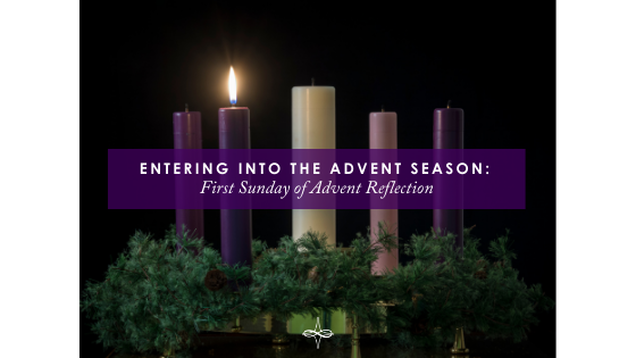|
Over the last several years of my life, I have read, studied, and written hundreds of pages about what Pope Francis meant when he said in Evangelii Gaudium that “The Church will have to initiate everyone – priests, religious and laity – into this ‘art of accompaniment’ which teaches us to remove our sandals before the sacred ground of the other” (169). However, nothing has ever taught me more about accompaniment than one of the most special people I have ever known in my life: my grandmother.
My grandmother, Edith Lauritzen, was born a second-generation Irish Catholic in 1928 in Queens, New York. She was soft-spoken but had a hearty laugh that made an appearance in most conversations. Her favorite food was Chicken Parmesan, and she taught me the first prayers I ever learned. Sometimes, my grandmother would pick my sister and me up after school and treat us to ice cream. She would ask us about our day at school, and listen generously, as if the happenings of my sister’s and my days at elementary school were the most riveting and important things she could devote her time to. I spent a good bit of my early childhood with my grandmother, and when my grandfather passed away, she moved in with my family to a small bedroom on the first floor of our home. In our house, my grandmother was a steady presence in my life; her warmth, laughter, and joy were always a comfort. I enjoyed spending time with her and would sometimes wake up early in the morning if I heard her making her breakfast of toast and coffee in the kitchen just so that I could spend time with her. As I grew up, our shared Catholic faith became a topic of frequent conversation. In middle and high school, I remember spending hours talking with her in her bedroom. My grandmother’s room was small, with space only for her bed, dresser, and an armchair. The feeling of my foot falling asleep sticks with me as I reflect on talking with her, as sometimes our conversations lasted hours as I sat cross-legged on her wooden floor. Beyond some vague memories of the topics of prayer, the lives of the saints, and my hopes to visit St. Peter’s basilica one day, I do not remember anything specific about the topics of conversation. Rather, what rises to the surface in my memory of those conversations with my grandmother is her listening, her interest in my thoughts, and her joyful, warm presence that created the space for me to speak up and share my insights with a woman with 65 more years of life experience. Now, I look back and know that I might have spoken with a little too much certainty about God and the things of faith, and probably mused a little too grandiosely about my reflections on what certain Gospel readings meant. However, that didn’t matter to my grandmother. This was the gift that my grandmother gave to me: taking my faith, questions, and thoughts seriously. My grandmother could have seen my early, inexperienced love of my faith as childish or naïve. Instead, I think she saw my faith as wisdom, blooming and in process, attempting to make sense of God and life. In front of my grandmother’s armchair and unbeknownst to us both, my vocation as a theologian and woman of faith was being nurtured and cultivated. After my first year at college, my family had to move my grandmother to an assisted living home as she needed more care than we could provide at my house. I was devastated. My home felt like it lost a little bit of warmth. However, that first summer after my freshman year of college, I made it part of my daily routine to visit my grandmother. I spent afternoons with her, listening to her thoughts and reflections on her life, her stories about growing up with the other children in her neighborhood in Queens, and her relationship with my grandfather. We laughed as she told stories about living in New York, what it was like to go to Mass in Latin, and why she loved St. Thérèse (her favorite saint). Before moving to the assisted living home, my grandmother had never lived away from home, so sometimes, she would cry. I learned in those moments that what was important was not me offering some nugget of wisdom from our faith that would help her to reframe her thinking, but for me to be there, hold her hand, and be present. In the days after those afternoons where there were more tears than laughter in her voice, I would make sure to bring her a cup of chocolate ice cream to lift her spirits. It did not take long for me to realize it was now my turn to accompany my grandmother, just as she had accompanied me in my childhood and teenage years. Two summers later, my grandmother passed away. It was one of the most painful days of my life. At the same time, I was overjoyed at the thought of my grandmother getting to experience something so much better than our hours of conversation together about our faith: God himself. At my grandmother’s funeral Mass, one of the hymns my family selected was “O God Beyond All Praising.” While the entire hymn is a perfect way to describe the gift that my grandmother was to everyone she encountered, the words of the second verse have always particularly stuck out to me when I think about her: “The flower of earthly splendor in time must surely die, its fragile bloom surrender to you the Lord most high; but hidden from all nature the eternal seed is sown - though small in mortal stature, to heaven's garden grown” In reflecting upon my relationship with my grandmother, I think about how her accompaniment of me planted seeds in my life that continue to bloom and grow. Though she was older and weaker, my grandmother passed on to me the gift of faith, a gift that is an eternal reality that we share, and that I hope will bring us together in the next life. Even when my faith was more composed of immature certainty and over-zealous explanations of Scripture, my grandmother saw more than that. And, when it was my turn to accompany my grandmother in the last years of her life, she gave me the gift of continuing to grow these seeds of faith through my own cultivation of patient listening and presence. For me, my grandmother is a model of accompaniment, and was a witness to what Pope Francis writes in Evangelii Gaudium of the listening and patience required in accompaniment: “Only through such respectful and compassionate listening can we enter on the paths of true growth and awaken a yearning for the Christian ideal: the desire to respond fully to God’s love and to bring to fruition what he has sown in our lives (171).” Through my grandmother’s love, I learned to listen to God and respond to His love. I know the seeds of my faith are continuing to grow and bloom even after my grandmother’s death as she accompanies me with her prayers. For more resources on accompaniment, please click here.
0 Comments
In this week’s Gospel, we hear Jesus encouraging us to “Be watchful! Be alert!” in waiting for the coming of the Reign of God. Jesus uses the image of a homeowner who first secures his home and belongings before leaving to take a trip. Because his travels take him far from his property, the homeowner is intentional about ensuring that his own property is in order before setting out for a new road and destination. We might imagine the factors that would drive his painstakingly detailed preparations: extra security to protect his home from thieves, people to check on the resources of the house to make sure that it doesn’t flood or become too drafty without anyone inhabiting it, and perhaps also to achieve a sense of his own inner peace, that he has taken an active role in protecting his property. Jesus’ parable reminds us the importance of securing our own “inner” home and taking an active role in preparing ourselves for our own journeys in life. For me, this parable brings to mind the importance of engaging in our own formation. During my time as an apprentice catechetical leader as part of the University of Notre Dame’s Echo Faith Formation Leadership Program, I was introduced to the hard work of formation. Formation is the intentional cultivation of our spiritual, human, intellectual, and pastoral qualities as human beings that allows us to live out our call to holiness in a generous and healthy way in ministry. In Echo, I entered the world of professional ministry for the first time. I learned quickly that ministry calls us to give deeply of ourselves; however, in being new to ministry, I neglected to secure my own “inner home” of my mind, heart, body, and soul before journeying out of myself to encounter others in the work of evangelization and catechesis. I was susceptible to the outside thieves of comparison, results-driven ministry, and how I could best show off my training and theological knowledge to those I served. In order to make an offering of my own life in ministry that truly served the coming of the reign of God and did not depend on my own efforts or ego, I had to learn to engage my own formation. I intentionally cultivated a life of prayer, took care in applying my studies in catechesis and ministry to my work, and reflected and healed through a relationship with a therapist. Over time, I felt revitalized and more able to cooperate with the Spirit’s work in my life and ministry because I was no longer focused on just trying to survive. Service Suggestion: In the Christian life, we are called to accompany others in the life of faith. A relationship of accompaniment is a perfect setting for formation; it allows us to lean on and learn from each other how best to imitate Jesus in our life. Is there someone in your own life, especially in difficult circumstances, who you might intentionally accompany this Advent? How can you help them secure their own “inner” house on the journey of faith through walking with them in solidarity, mutuality, and listening? Focus: Spirituality By failing at trying to minister based on my own efforts to be the most knowledgeable and most available to those I served, I learned that with the help of the Holy Spirit, I had to engage my own formation so I could be awake, alert, and ready to make of myself a healthy and holy offering. Through formation, I grew to become a minister with her house in order while being on the journey of faith and ministry, prepared to meet Jesus in those I served “whether in the evening, or at midnight, or at cockcrow, or in the morning.” How can you aim to put your own inner house in order this Advent? Are there spaces in your life where you can engage in your own formation in order to make a more generous and healthy offering of your life? Prayer God, Isaiah speaks out “Yet, O Lord, you are our father; we are the clay and you the potter: we are all the work of your hands.” We remember that our lives are the spaces where our salvation unfolds, where we are formed and shaped into art by you, the Artist of Artists. Send your Spirit upon us to be moved by those you place in our path so we may be formed in compassion, empathy, and solidarity. Strengthen us to take an active role in shaping our world to be a reflection of your infinite love through the witness of our lives. Amen.
11/19/2020 Fratelli Tutti: On Fraternity and Social Friendship - Top Quotes from Pope Francis' Latest EncyclicalRead NowOn the vigil of the Feast of St. Francis of Assisi, the saint who influenced the choosing of Pope Francis’s papal name, Pope Francis released the encyclical Fratelli Tutti on fraternity and social friendship. Beginning with the example of St. Francis himself and continuing with the parable of the Good Samaritan, Pope Francis calls the world once again to consider the common good and to strive for unity based on fraternal charity. In doing so, he reminds humanity of an important truth: that we belong to one another. In this blog series, I’ll be sharing some of my favorite quotes from the pope’s latest encyclical. May they bring you peace, hope, and joy as we continue to grow and adapt in the midst of the COVID-19 pandemic and its effects on our world. “Let us dream, then, as a single human family, as fellow travelers sharing the same flesh, as children of the same earth which is our common home, each of us bringing the richness of his or her beliefs and convictions, each of us with his or her own voice, brothers and sisters all” (FT, 8) Today I believe that many of us have forgotten to dream. We are mired down with anxiety, isolation, pandemic fatigue, stress, financial and political uncertainty, or disillusionment. In Fratelli Tutti, Pope Francis reminds us to dream and to hope. There is room for each person at God’s table. Each person brings their own gifts, talents, knowledge, expertise, experiences, and self to the world. Rather than reject our differences, it is important to acknowledge and even celebrate the richness in our human diversity. We are many parts, but one body. Let us celebrate our humanity and practice dreaming once again—of unity, of peace, of justice, of truth, of love. “Instances of racism continue to shame us, for they show that our supposed social progress is not as real or definitive as we think” (FT, 20). As several incidents within the United States have reminded our nation once more, racism is a sin which directly contradicts the truth that all people are born with equal dignity in the image and likeness of God. The sin of racism continues to be present in our world, and eliminating it involves the intentional work and learning of each person. This process includes listening to other’s stories and journeys, learning about and from history, conducting a personal examination of conscience, and intentional action to change systems and structures of racism. Pope Francis reminds us that racism is intolerable, not only among Catholics, but among mankind as a whole. “True, a worldwide tragedy like the Covid-19 pandemic momentarily revived the sense that we are a global community, all in the same boat, where one person’s problems are the problems of all. Once more we realized that no one is saved alone; we can only be saved together” (FT, 32) Although the COVID-19 pandemic has wrought havoc on the way we live, times of hardship also remind us of what’s important. Often, we re-focus on our priorities because we are reminded not to take them for granted. Many turn to faith, family, and community and are more likely to help those who are less fortunate. Practicing gratitude is an essential component of not only surviving but thriving in times of hardship. Pope Francis points out that tragedies such as COVID-19 can bring humanity together in a common bond of fraternity. Let us turn outward during this time and use our talents and resources to bring joy, love, and hope to others. “We have the space we need for co-responsibility in creating and putting into place new processes and changes. Let us take an active part in renewing and supporting our troubled societies. Today we have a great opportunity to express our innate sense of fraternity, to be Good Samaritans who bear the pain of other people’s troubles rather than fomenting greater hatred and resentment” (FT, 77) Co-responsibility is an important theme at the Catholic Apostolate Center that has been given even greater attention in the Church today. It involves collaboration from the beginning and values the important contributions each person brings to the Church and world. St. Vincent Pallotti, patron of the Catholic Apostolate Center, understood that the Church cannot thrive and spread the Gospel without the active participation of the clergy, religious, and laity. Today, Pope Francis reminds us that we all have a role to play in the renewal of the Church and world. This begins when we can accompany our brothers and sisters, stand in solidarity with those who are hurting, and bring them the joy of the Gospel. “Solidarity finds concrete expression in service, which can take a variety of forms in an effort to care for others” (FT, 115) Charity comes alive in works, just as St. Paul says, “faith without works is dead.” The Gospel is lived today through our actions—an understanding promoted in Catholic Social Teaching and exemplified through the corporal and spiritual works of mercy. It is one thing to express solidarity with our brothers and sisters, but a very different thing to walk alongside and serve them. Pope Francis is calling us to both. As we are reminded in Gaudium et Spes, “Man…cannot fully find himself except through a sincere gift of himself” (24). “Nor can we fail to mention that seeking and pursuing the good of others and of the entire human family also implies helping individuals and societies to mature in the moral values that foster integral human development...Even more, it suggests a striving for excellence and what is best for others, their growth in maturity and health, the cultivation of values and not simply material wellbeing. A similar expression exists in Latin: benevolentia. This is an attitude that ‘wills the good’ of others; it bespeaks a yearning for goodness, an inclination towards all that is fine and excellent, a desire to fill the lives of others with what is beautiful, sublime and edifying” (FT, 112) In the Christian worldview, politics, economics, culture and society must be built and exist for the common good. They are man-made structures designed to serve this purpose. In pursuing the common good, we aim to create a society in which mankind can flourish as a result of respect for every person’s inherent dignity. As St. Thomas Aquinas stated, “Love wills the good of the other.” Pope Francis echoes this truth and reminds us that willing this good is comprehensive: we must care about one another’s spiritual well-being as well as our physical well-being. When man’s fundamental needs are met—when he is cherished, nurtured, respected, fed, and rested—he is better able to “fill the lives of others with what is beautiful, sublime and edifying.” He is able to reach out and better experience and rest in the divine. To learn more about Fratelli Tutti, please click here. In the movie The Farewell, the central plot hinges on the question of an individual vs. communal approach to the burden of end of life care. One of the central characters has cancer, and the issue surrounding the family is whether the person with the disease should know or not. In the US, as the movie acknowledges, such duplicity would not be likely to happen, but in China, where the movie takes place, society often allows for such things because they believe the burden of suffering is to be carried by the family and friends rather than the sick or afflicted. I found that to be a fascinating concept because most of us have experienced the loss of someone due to cancer, and the question of death and mourning is a very present concern to all of us. I would recommend viewing the movie, if for nothing less than to understand the potential hardships of walking with someone who is about to die and with those that love them. Our faith acknowledges that our time on earth is not all that there is, but rather that we are made for heaven and joining God. The Catechism of the Catholic Church declares: “The Christian funeral is a liturgical celebration of the Church. The ministry of the Church in this instance aims at expressing efficacious communion with the deceased, at the participation in that communion of the community gathered for the funeral, and at the proclamation of eternal life to the community (CCC 1684).” As Catholics, we believe that there is life after our life on earth. So the funeral and death itself serve as reminders of the Paschal Mystery and our hope for all—and in particular, those who have just died—to have eternal life in heaven with the Lord. The prayer spoken while receiving ashes on Ash Wednesday is a poignant reminder of this: “Remember you are dust and from dust, you shall return.” Time on earth is fleeting, but time in heaven is eternal. As Catholics, we are part of a community of believers. We must not only accompany the one who is preparing to die, but also those who the deceased is leaving behind. This is not the responsibility solely of the priest or deacon presiding over the funeral rites, but rather a shared responsibility of all the church. The Catechism goes further to explain that funeral ceremonies have the Eucharistic Sacrifice as a critical component because: “It is by the Eucharist thus celebrated that the community of the faithful, especially the family of the deceased, learn to live in communion with the one who ‘has fallen asleep in the Lord,’ by communication in the Body of Christ of which he is a living member and, then, by praying for him and with him” (CCC, 1689). It is essential as a community of faithful to also accompany those left behind who are grieving the loss of a loved one. This grief is normal and completely human, but it means that we need to accompany those grieving and serve as a living reminder of Christ’s presence in their lives. We are called to serve as witnesses to those we encounter daily, whether we know them well or not. As stated in the book the Art of Accompaniment: Theological, Spiritual, and Practical Elements of Building a More Relational Church: “Witnessing can be effective even if a deep, committed relationship is not yet formed…witnessing demonstrates an example of an integrated Christian life within the one who witnesses. … Witnesses are essential to the process of spiritual accompaniment because, ‘modern man listens more willingly to witnesses than to teachers, and if he does listen to teachers it is because they are witnesses (Evangelii Nuntiandi)’ (Art of Accompaniment 16)” Times of suffering and hardship are especially profound moments for evangelization and witness. As a Church, we can offer hope and healing to those who are dying or grieving the loss of a loved one. For more resources on Accompaniment, please click here. Spiritual accompaniment has been discussed greatly today within the Church and is an important theme of Pope Francis’ papacy. While accompaniment is manifested throughout the Old Testament and in Christ’s ministry, it is important for the Church to consider how best to implement it in modern times. What does accompaniment look like today? How do we best accompany others along their spiritual journey in deepening their relationship with Jesus Christ? The Art of Accompaniment: Theological, Spiritual, and Practical Elements of Building a More Relational Church, a Catholic Apostolate Center resource developed by Colleen Campbell and Thomas Carani, assists in the growth of true accompaniment within the Church today. Below are ten quotes from The Art of Accompaniment that summarize some of the major points of this important resource in order to introduce you to accompaniment and its role for Christians today. 1. “Since the creation of human beings, God has communicated his love through a relationship with humanity…The Old and New Testament reveal the Trinitarian God to be a God who accompanies.” God models accompaniment for humanity in his self-revelation and relationship with his people throughout salvation history. After the Fall, God revealed himself in his various relationships with important figures such as Abraham and Moses in the Old Testament, culminating in the sending of his Son, Jesus Christ, for the salvation of the world. God Himself is the first model of accompaniment. We look to His example in order to understand and implement accompaniment in the Church today. 2. “Spiritual accompaniment is the apostolate of intentional relationship that is oriented toward a definitive direction of growth in holiness and transformation in the Person of Christ.” Colleen and Tom define accompaniment succinctly: spiritual accompaniment does not happen by accident, but is the result of an intentional decision made by two people. The goal of spiritual accompaniment is a deepening in one’s personal relationship with Jesus Christ and in personal holiness that transforms both the mentor and the person being accompanied, as well as those they encounter. 3. “To remain committed to this deliberate choice of discipleship, a mentor is an active participant in their own spiritual formation, deliberately choosing the path of discipleship as their everyday way of life.” A mentor never ceases to pursue holiness, personal development, and spiritual formation. These are life-long endeavors to which the mentor and the person being accompanied dedicate themselves. 4. “Listening is a crucial practice of the mentor because it not only creates space for openness between mentor and the one accompanied, but also makes room for an awareness of the presence and action of God.” An important part of the spiritual life that Pope Francis has emphasized is the art of listening. We must be silent in order to hear the voice of God and the promptings of the Holy Spirit. The ability to listen well is also incredibly important to the art of accompaniment. When a mentor is adept in the art of listening, he or she affirms the dignity of the person being accompanied and humbly leaves room for the voice of God to be heard and acknowledged. 5. “Discernment is a supernatural gift of the Holy Spirit and useful in coming to identify the movements and actions of God in daily life.” Both the mentor and person being accompanied must grow in their ability to discern the work of God and the presence of the Holy Spirit. While there are many resources within the Church that help form a person in their understanding of discernment, it is ultimately a gift of the Holy Spirit. By praying for clarity, understanding, and wisdom, and by approaching the accompanying relationship in a posture of humility, both the mentor and person being accompanied create an environment in which the actions of God are received and acted upon. Ongoing discernment is crucial to spiritual accompaniment. 6. "Mentors are formed by the community as a result of encountering diverse groups of people, listening to different perspectives, seeking guidance from others, and worshipping and seeking Christ amongst the family of the children of God." The spiritual life does not and cannot exist in a vacuum; the same is true with accompaniment. Both the mentor and person being accompanied are formed by their parishes and communities. The beauty of our relational existence is that our communities of faith are comprised of all sorts of people. This diversity within our parishes enriches each member of the Body of Christ and deepens compassion, understanding, and a spirit of inclusion that helps the mentor better accompany another person. 7. "As they share the journey of the Christian life with the one accompanied, the mentor evangelizes the accompanied by fostering an encounter with Christ in their daily life, drawing connections between the Gospel message and their everyday experiences, and encouraging them toward ongoing conversion to Christ through the relationship of accompaniment." An important aspect of accompaniment is that it is a mutual journey towards Christ. Accompaniment does not happen only in Church settings and does not only address topics of faith—it encompasses an entire life. Our faith life also does not occur in a vacuum, but should impact and inform every aspect of our existence. As a result, accompaniment helps both the mentor and the one being accompanied to draw connections between the Gospel and everyday life. 8. "Those accompanied are open to formation and display their willingness to be formed by authentically seeking holiness, collaborating with their mentor, remaining humble in the midst of difficulty, and giving thought and prayer to challenges or new ideas…they must seek faith formation through study, catechetical ministry through parishes or Catholic institutions, and their own personal learning." Humility is a crucial component of an accompanying relationship—especially for the one being accompanied. The person being accompanied acknowledges the need to walk alongside a mentor and to be formed by them in order to grow in holiness and a relationship with Christ. Therefore, the mentor is an authority figure that respectfully and lovingly informs and collaborates with the one being accompanied, as well as with the Holy Spirit. Furthermore, the one accompanied also seeks personal formation in other trusted places. 9. "In the relationship of accompaniment, the marginalized are provided a space in which they can come to deeply know the love of Jesus Christ through friendship, guidance, and authenticity with a mentor." No one is exempt from an accompanying relationship—it is an important part of the spiritual life that all are invited to. A relationship of accompaniment results in the greatest treasure on earth: friendship with and love of Jesus Christ. A mentor is more than an authority figure. He or she is a friend, helper, and guide who affirms a person’s dignity and walks alongside another to build up the Body of Christ. 10. "The inspiration and model for the apostolate of accompaniment is Mary…In Mary, the Church has a model and intercessor for the apostolate of accompaniment." We cannot have a vibrant and lasting life of faith and thriving relationship with Christ without looking to and having a relationship with His Mother, Mary. The Blessed Virgin Mary always leads us closer to her Son. By looking to her and seeking her guidance and intercession, we can be sure that our efforts to accompany and be accompanied will bear much fruit. To learn more about The Art of Accompaniment and order your copy today, please click here. The arrival of New Year’s Day often brings with it resolutions, goals, and new words or phrases that help us try to shape the next 365 days before us. Things like healthy eating, stricter budgets, more time spent in prayer, and increased amounts of exercise define our drives for self-improvement. We give extra time to turn our focus inward to make ourselves stronger, smarter, holier, and healthier. In an attempt to change our lifestyles, we might separate ourselves from our previous habits, relationships, or preferences so that we can sharpen our focus even more on self-growth. We hone our discipline and increase our self-reliance in the name of improvement. In the new year, our focus is often inward. While this inward focus isn’t harmful in itself, we might find ourselves stuck in our self-reliance. Now that a few weeks into the new year have passed, many of those resolutions, goals, and mantras might have faded into the background of post-holiday life. At this point, many of us have lapsed in our new practices, or we might have abandoned our resolutions altogether. We might find ourselves isolated in the new patterns we have picked up or starting to flounder due to a lack of support. Even though our New Year’s resolutions may have been made with the best or holiest of intentions, we might find ourselves failing without others to encourage us, support us, or hold us accountable. While the new year is the time when our focus is inward, the weeks soon after, when our discipline begins to wane, give us cause to lean outward. What would it look like to lean outward in our resolutions in the weeks ahead by seeking others to help us carry them out? Why might allowing ourselves to be helped by others and accompanied by them lead us to a more meaningful and spiritually significant pursuit of our resolutions? Though as Catholics we frequently hear about accompaniment in a context of explicitly spiritual progression, its fruitfulness is still applicable in non-explicitly spiritual goals in an informal sense. As the final document from the Synod on Young People, the Faith, and Vocational Discernment reminds us, “accompaniment cannot limit itself to the path of spiritual growth and to the practices of the Christian life” (Final Synod Document, 94). Accompaniment can help us experience transformation in many areas of our lives in addition to our spiritual life, as it “fosters growth in holiness through everyday circumstances and interests” (The Art of Accompaniment, 15). Though on the surface it may look like simply reaching out for the help of a friend, seeking out accompaniment to help us carry out our New Year’s resolutions has a deep theological and spiritual significance. Accompaniment is a form of “bear[ing] one another’s burdens [in order to] fulfill the law of Christ” (Galatians 6:2). When we seek another’s help to bear our burdens, experiences, hopes, and challenges, we open ourselves up to be in communion with someone else; we profess that we were created by God out of love, to love, and to be loved by others. Accompaniment is a simple way by which we actively remember that “The LORD God said: It is not good for the man to be alone” (Genesis 2:18). When we seek the help of another, we affirm the beauty of being human: we’re not meant to live life completely on our own effort and initiative. Having a good listener, mentor, or friends helps us to turn our inward focus in our resolutions outward. We no longer remain alone in our efforts, strivings, or discipline. The support of another trusted person helps us remain steadfast in our resolution to be healthier, spend more responsibly, or love more generously. This support can take the form of a quick text from an accountability partner to check in on our progress, or a weekly meet-up with a mentor to discuss our challenges. Similarly, we can seek more formal relationships of accompaniment to help meet our goals. Beginning a relationship with a therapist might help us explore more deeply our relationship with others or just as seeking the help of a personal trainer might allow us to have the added accountability to eat more nutritiously or get physically fit. Relying on others in the pursuit of transforming ourselves reminds us of the beautiful gift of being human: as human beings, we can have a profound effect on one another in providing support, love, and encouragement in growing into the people God has destined us to be. Whether sought out in a formal or informal sense, accompaniment challenges us to let ourselves be loved by others in the simplicity and complexity of our everyday life. Allowing ourselves to be supported by others, even in something as simple as our New Year’s resolutions, reveals the deep significance of others to our vocation to holiness.
10/24/2019 The Apostolate of Accompaniment: Creating an Environment of Accompaniment in Our ParishesRead NowWhen people speak about the work of evangelization or accompaniment, they often speak about going out to the margins, “to the highways and the hedgerows” (Luke 14:23,) to bring the “nones” and the unbaptized into the Church. This is, of course, an essential part of Jesus’ final commission to his apostles to baptize and make disciples of all nations (Matthew 28:16-20). But I have to wonder: what’s the state of spiritual health in our own parishes? Are the lay faithful aware that their sacramental experience is an encounter with Christ, and do they care about their brothers and sisters with whom they share Communion? Are the people in our pews accompanied by anyone in their journey of faith or are they trying to live their faith on their own? There are many definitions for spiritual accompaniment, but in the book I co-authored with Colleen Campbell as a resource for the Catholic Apostolate Center, we define spiritual accompaniment as “the apostolate of intentional relationship that is oriented toward a definitive direction of growth in holiness and transformation in the Person of Christ.” In general, accompaniment is “a broad term that refers to a relationship between two or more people who share mutuality and reciprocity in the spiritual life” (The Art of Accompaniment). I believe this “apostolate” of accompaniment is essential to a parish’s spiritual health for three main reasons: First, creating a culture of accompaniment in the parish enables the lay faithful to be who they are called to be by their baptism. In the Rite of Baptism, we receive the Holy Spirit and we are made members of Christ’s Body. As members of the same Body, we have a responsibility to bring the light and love of Christ to one another. As Paul writes in First Corinthians, the various parts of the body must have concern for one another because we need each other (1 Corinthians 12:21-26). When members of the lay faithful take an interest in one another’s faith journeys, encouraging one another on that journey, they are living their Christian vocation as the Church intends. When members of the lay faithful are not concerned for members of their parish community, they become spiritually stunted and begin to believe that faith does not require community in one Body. Second, accompaniment helps a parish to become the best ordinary place of encounter with Christ. The parish is the most likely place where an individual begins his faith journey. Churches that sit on familiar street corners appear as safe havens for those who seek the Lord or some other help. The parish must embrace a culture of accompaniment so that when individuals approach it seeking communion, they are met with a warm and welcoming response instead of sacramental hoops or parish boundary restrictions. Accompaniment challenges parish staff and parishioners to “[respect] the dignity of the human person, and [seek] to increase their freedom to respond to the all-encompassing love of God within their life” (The Art of Accompaniment). Finally, it’s important that we implement a culture of accompaniment in our parishes because one of the goals of accompaniment is liturgical worship, and this can only take place in the parish. Sacramental theology reminds us that the sacraments are how Jesus accompanies and remains with his Church in a physical way (CCC 1088). Accompaniment’s goal is “transformation in the Person of Christ,” and if the lay faithful are serious about accompanying one another, they will encourage one another to seek out liturgical life at the parish, because the sacraments sanctify us, build up the body of Christ, and give worship to the One who Accompanies. For more resources on Accompaniment, please click here. To purchase The Art of Accompaniment, please click here. |
Details
Archives
April 2024
Categories
All
|
About |
Media |
© COPYRIGHT 2024 | ALL RIGHTS RESERVED















 RSS Feed
RSS Feed